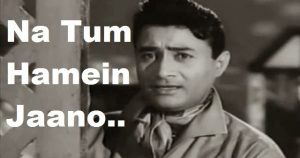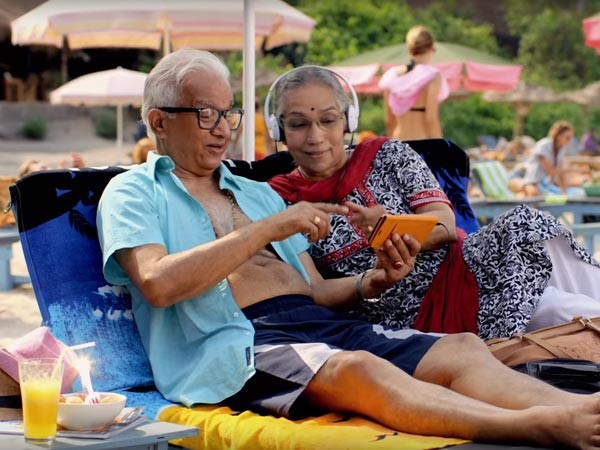Singers bring soul to the song. They put life into the lyrics, and add the energy to the tune. Lata Mangeshkar has said in one of her interviews that doing classical vocals is easier because it has room for improvisation. But when a singer does playback singing, he/she is required to go exactly by the requirements of the character on screen. Lata Mangeshkar used to do her own research to find out what the heroine was supposed to be doing, why was she singing the song etc. Therefore, p layback singing requires a tremendous amount of precision in rendering the lyrics and tune, the playback singer needs to add those emotions in song.
layback singing requires a tremendous amount of precision in rendering the lyrics and tune, the playback singer needs to add those emotions in song.
Mohammed Rafi, Lata Mangeshkar, Asha Bhosale, Suman Kalyanpur, Kishore Kumar, Manna Dey, Mukesh have been the magnificent pillars of our Hindi film; their invaluable contribution to playback-singing is eternal. Their singing has laid the foundation of the ‘Golden era’ of Hindi cinema. This was the era when melody reigned supreme and songs formed an integral and inseparable part of our films. Music directors such as Salil Chowdhary, S.D.Burman, Kalyanji-Anandji, Laxmikant-Pyarelal, Roshan gave unmatched music to lyricists such as Pradeep, Bharat Vyas, Sahir Ludhiyanvi, Kaifi Azmi, Sahilendra, Majruh Sultanpuri and many more lyricists penned songs of various human emotions, abundance in nature, human life cycle, flowers, birds, sunrise, sunset, rives, hills, mountains, seasons and so much more. The singers, music directors and lyricists together gave us several incomparable solos and many remarkable duets which are set in in the psyche of every person.
Often in our films one song has been sung by two different playback singers and is woven into the narrative in such a way that they appear at different times in the course of the film depending on the story and the mood of the characters involved. The title song of ‘Raat Aur Din’ (1967) has been heard on radio more in Lata’s voice than in Mukesh’s and has never lagged behind the male version. Similarly, Rimzim gire sawan from film Manzil is a twin song sung by Kishore Kumar and Lata Mangeshkar. There are many classic twin songs sung by both male and by female playback singers. These songs are normally used in Hindi Films with an intention to express similar-sounding sentiments under different circumstances. When two singers sing the same song with little differences may be in tune or lyrics here and there people do lot of comparison in terms of who sang it better….. At times the versions differed – one sad and one happier. In some songs the male version sounds superior while in some the female version sounds better. I give here below five twins – evergreen dual songs:
Rangoli (1962) ‘Choti si ye duniya,pehchaane raaste hain…’
Kishore Kumar gets to sing the happy version while Lata Mangeshkar sings the sad version. Once again, it was Kishore Kumar’s version which hit the popularity charts. Sad version or happy version, Kishore’s magic was unbeatable.
Baat Ek Raat ki (1962) Na tum hume jano, na hum tume jane
This song is sung very melodiously by Hemant Kumar picturised on Dev Anand and by Suman Kalyanpur picturised on Vahida Rehman. Till date this song is considered a timeless cult classic an evergreen beautiful romantic song.
Hum sab ustad hain (1965) ‘Ajnabi tum jaane pehchaane se…’
In this song, Kishore Kumar gets to sing the sad version thus adding a lot of pathos to his emotions while Lata Mangeshkar’s version is breezier and obviously sung in happier times. But the beautiful tune composed by the duo of Laxmikant-Pyarelal stands out in Kishore’s voice so much so that for years people were not even aware of the female version.
Chiraag (1969) ‘Teri aankhon ke siva…’
While the happy version is sung by Rafi where Sunil Dutt describes the beauty of Asha Parekh’s eyes, the sad version is sung by Lata after Asha Parekh loses her eyesight in a tragic way. In this song, Rafi’s version became more famous.
Manzil (1979) ‘Rimzim gire sawan’
This melodious composition by R D Burman had two superb versions once again by Lata Mangeshkar and Kishore Kumar. While the Lata version picturized in a unique manner on Amitabh Bachchan and Moushmi Chattetjee captures the essence of romance during Mumbai’s monsoon, Kishore Kumar’s version is a simple rendition sung by Amitabh in the film at a friend’s engagement ceremony with just a harmonium to give him company. The kind of popularity attained by Kishore Kumar’s version was phenomenal yet not surprising because there is something so unique about his simple rendition that it touches the soul right away from the very first note of the song. Somehow Lata’s version just could not whip up that kind of emotion in the listener’s hearts and had to settle for the second position.













































